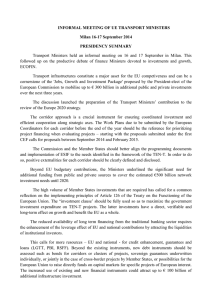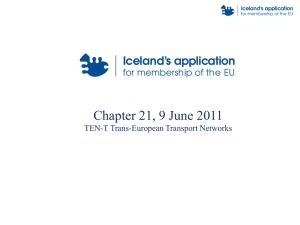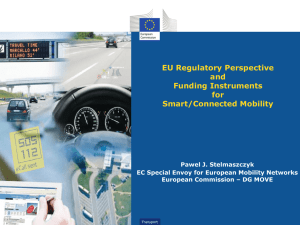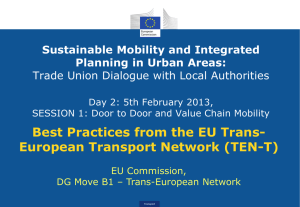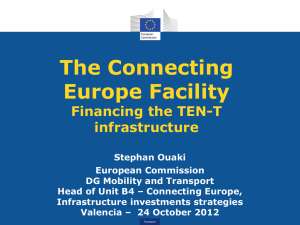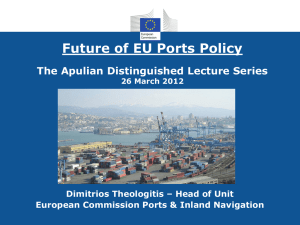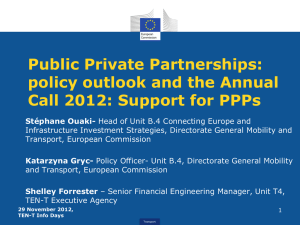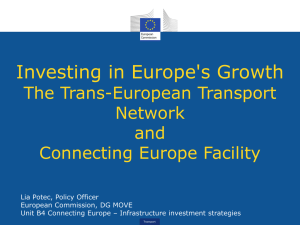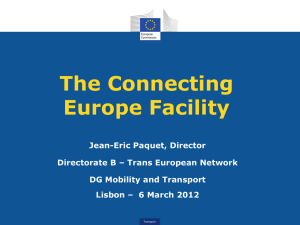North Sea Commission work on Transport
advertisement
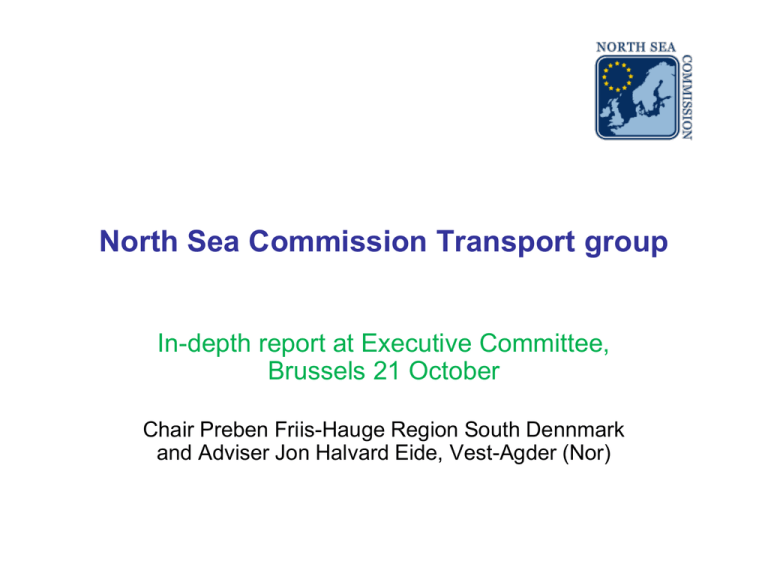
North Sea Commission Transport group In-depth report at Executive Committee, Brussels 21 October Chair Preben Friis-Hauge Region South Dennmark and Adviser Jon Halvard Eide, Vest-Agder (Nor) Key issues in Work Plan 2014 - 2015 • Ensure good access to TEN-T Core for peripheral and maritime regions – – Arguments and statements to TEN-T policy Work to ensure that the NSC is represented in corridor forums to be established for the implementation of relevant Core Network Corridors (NS-Baltic, Scandinavian-Mediterranean and NS-Mediterranean Support measures and incentives to promote clean transport incl. clean shipping • • • Compile and disseminate existing good practice Developing or capitalizing on results from relevant EU-funded projects. Explore the conditions for and consequences of implementing the IMO & EU Sulphur Directive in the NSR EU policy context – TEN-T TEN-T policy aims to close the gaps between Member States' transport networks, remove bottlenecks and bridge missing links that still hamper the smooth functioning of the internal market and overcome technical barriers TEN-T guidelines adopted in December 2013: from patchwork of isolated projects to integrated network. • A Core network with the most important links and hubs to be completed by 2030 • A Comprehensive network with the rest of the transport system to be completed by 2050 • 26 bn Euro under Connecting Europe Facility (CEF) have been dedicated for the implementation of TEN-T – the major part allocated to the core network TEN-T continued • The implementation of the TEN-T will be pushed ahead by the establishment of nine core network corridors • A European Coordinator for each of the nine core network corridors, and for Motorways of the Sea (MoS) and Rail Traffic Management (ERTMS) have been nominated • The Coordinators are assisted by the Corridor Fora which gather the Member States and relevant stakeholders involved, such as infrastructure managers, port authorities and regional authorities, as well as representatives of civil society, such as the CPMR and the NSC • Detailed studies for each corridors will provide the scientific basis for the definition of corridor work plans that will guide and coordinate the investments to be made over the next year. TEN-T Core network corridors Key issues in Work Plan 2014 - 2015 Ensure good access to TEN-T Core for peripheral and maritime regions • The Transport group has provided arguments and statements to the TEN-T policy to influence the definition of the core network, to strengthen links between the comprehensive and the core network, and to upgrade the role of MoS. – All nominated NSC member regions (Örebro, Västra Götaland Schleswig-Holstein and South Denmark) were invited to the third meeting of the Scandinavian-Mediterranean Core Network Corridor Forum in Brussels on 01 - 02.10.2014. Nord-Pas de Calais region will attend a similar meeting for the North Sea-Mediterranean corridor • A group member from Aberdeenshire attends a meeting on the strategic planning for TEN-T Core Network Corridors' in Brussels, 21 Support measures and incentives to promote clean transport Compile and disseminate existing good practice • Aberdeenshire Council is in the process of screening of a big European database on best practice in sustainable passenger transport and some 50 practices will eventually be made available on the NSC home page as part of a "tool kit" for the benefit of the member regions Explore the option of developing or capitalizing on results from relevant EU-funded projects. • The Transport group is monitoring a number of Interreg projects such as GreCor (Green Corridor) and TenTans (regional aspects of TEN-T) • Members of the group are developing projects ideas for the new Interreg North Sea Region Programme • The group will also start to explore the potential for transport projects under Horizon 2020 Clean shipping – the international & EU policy context • The EU adopted a Directive in 2012 imposing a drastic reduction in sulphur emissions from ships from 2015/2020, following a decision by the International Maritime Organisation (IMO) in 2008 The North Sea, the English Channel and the Baltic Sea have been designated as a Special Emission Control Areas where the strictest standards are to be implemented already from 2015 Other obligations regarding the emission of nitrogen oxides (NOx) might come into effect on 1 January 2016 and measures on greenhouse gases could take effect in 2020 or 2025 Considerable investments from both port authorities and ship owners in alternative supply facilities and engines are required in order to fulfill the Sulphur directive Clean shipping cont. • High adaptation costs for ship owners and ports might transfer goods back to the roads – contrary to EU transport policy objectives • Lack of level playing field between sea basins as some must comply 5 years before the others • Challenges are foreseen with efficient monitoring of compliance with the Directive • A European Sustainable Shipping Forum (ESSF) has been established by the EU Commission to ease the implementation of the Directive. The NSC member region Nord-Pas de Calais is representing the CPMR in the ESSF CPMR and NSC actions on clean shipping • The Transport group is exploring the conditions for and consequences of implementing the IMO & EU Sulphur Directive in cooperation with Interreg projects and the CPMR • The group has been shadowing and disseminating results from the Clean North Sea Shipping project, and has started to study how the results of the project could be applied to support policy and project development • The NSC is part of the CPMR Dunkirk Declaration from 2013, requesting a flexible application of the SulphurDirective and sufficient financial support for the industry to adapt • The group is following the work of the European Sustainable Shipping Forum through the CPMR Transport working group and NSC member region Nord-Pas de Calais
